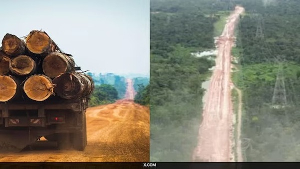 This photo reflects the theme of this article
This photo reflects the theme of this article
The Amazon rainforest, often referred to as the "lungs of the Earth," plays a crucial role in global climate regulation by absorbing vast amounts of carbon dioxide and producing oxygen.
However, the decision to construct highways through the Amazon to facilitate COP30, a global climate conference, presents a paradoxical challenge.
While the summit aims to promote sustainability and combat climate change, the infrastructural development threatens one of the world’s most vital ecosystems.
This article explores the environmental cost of such projects and the contradiction between sustainability goals and environmental destruction.
The Need for Infrastructure vs. Environmental Preservation
Hosting a global event like COP30 requires efficient transportation and accessibility. Governments argue that infrastructure improvements, including highways, are necessary to accommodate participants and logistics.
However, these developments come at a steep environmental price. Roads act as gateways to deforestation, accelerating illegal logging, mining, and land grabbing for agricultural expansion. The delicate balance between infrastructure needs and forest preservation becomes a contentious issue in climate discussions.
Deforestation and Biodiversity Loss
Highway construction in the Amazon leads to widespread deforestation, disrupting ecosystems that house nearly 10% of the world’s known biodiversity. The removal of trees not only destroys habitats for countless species but also disrupts ecological functions like carbon sequestration and water cycles. Studies have shown that roads through rainforests increase deforestation rates exponentially, as they provide access for illegal activities that further degrade the environment.
Carbon Emissions and Climate Impact
Deforestation caused by road construction contributes significantly to global carbon emissions. The Amazon serves as a crucial carbon sink, storing approximately 150-200 billion metric tons of carbon. When forests are cleared, carbon is released into the atmosphere, exacerbating climate change. This undermines the very objectives of COP30, which seeks to promote carbon neutrality and sustainable development.
Indigenous Communities at Risk
The Amazon is home to numerous indigenous communities who depend on the forest for their livelihoods and cultural heritage. Highway expansion disrupts traditional ways of life, leading to displacement, loss of land, and conflicts over resource use. Indigenous groups have voiced concerns about the lack of consultation and the destruction of their territories, further highlighting the ethical dilemma of such projects.
The Greenwashing of Sustainability Efforts
The decision to build highways in the Amazon for a climate summit raises concerns about greenwashing presenting an environmentally harmful action as sustainable. While COP30 aims to advance climate solutions, the infrastructure projects contradict these efforts, casting doubt on the credibility of sustainability commitments. The environmental cost of such projects challenges the integrity of global climate negotiations.
Alternative Solutions and Sustainable Development
Instead of prioritizing destructive infrastructure, alternative solutions could enhance accessibility while preserving the Amazon. Investments in sustainable transportation, such as river-based transport or controlled air travel, could reduce the need for extensive road networks. Additionally, hosting COP30 in locations with existing infrastructure could minimize environmental degradation.
Conclusion
The construction of highways in the Amazon to host COP30 presents a critical dilemma between sustainability goals and environmental destruction. While infrastructure is essential for hosting large-scale events, the consequences of deforestation, carbon emissions, biodiversity loss, and indigenous displacement cannot be ignored. True sustainability requires a commitment to protecting natural ecosystems rather than compromising them for short-term convenience. If global climate summits are to lead by example, they must ensure that their actions align with their environmental objectives.
Cedric Dzelu is Ag. Executive Secretary: African Youth Commission and Executive Director, Frontline for Climate Action cedricdzelu@gmail.com